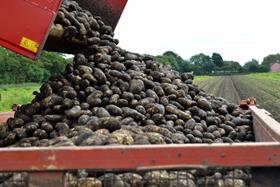
Research from the University of Nottingham has helped secure a longer period of financial support for farm businesses as part of the new Agriculture Act.
A consortium of universities and colleges led by Professor Paul Wilson from the University of Nottingham has carried out research that has provided data and insights to Defra to use as evidence informing the policies in the Bill, which received Royal Assent yesterday (12 November).
The University of Nottingham has been the lead research institution for the annual Farm Business Survey (FBS) for many years, but it said the survey’s findings have “never been more important”.
Results from the Defra-commissioned survey, which looks at the performance of over 1,750 English farms each year, formed over half of the evidence used to produce the new Bill.
The Agriculture Act will provide the legal framework for the establishment of a new system of agricultural assistance for farmers and land managers.
The Bill is essentially “enabling” legislation, providing fairly broad powers to current and future governments to provide financial assistance and make other policy interventions.
One of the biggest changes in the new Bill is removing the subsidy Basic Payment Scheme (BPS) that’s been in place for farmers.
Data from the FBS showed the potential detrimental impact losing this income in only five years would have on some farmers.
Using this evidence, Defra extended the BPS transition period to seven years and also changed the way the payments would be reduced to take into account the size and turnover of the business.
Wilson said: “Our research showed that the amount of reliance on the BPS system varied, for example smaller upland farmers and sheep and beef farmers rely heavily on this payment so the impact for them on losing it suddenly would be huge.
“The solution Defra took from our evidence was to extend the transition period from five to seven years and to modify the reduction amounts depending on the size of the farm business.
“In doing this, we think rural businesses will be better placed to manage and protect their finances over a longer period as the BPS payment is withdrawn.”
Another key part of the Bill that University of Nottingham research fed into was the importance of sharing data and performance.
Working with Cambridge University, an online benchmarking tool was created that allows farm businesses to compare performance allowing them to identify areas for improvement.
“It is great to see a new piece of legislation like the Agriculture Bill being underpinned by the research we do,” Wilson said.



